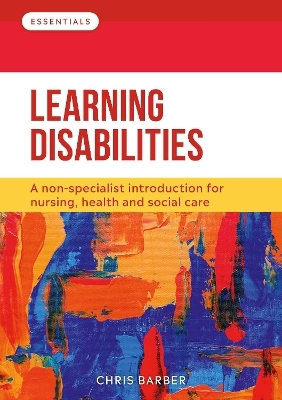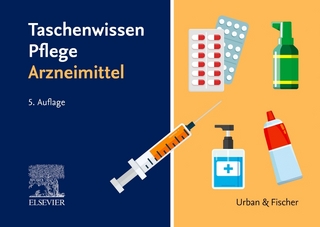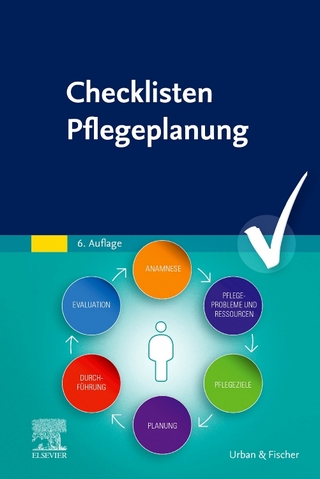
Learning Disabilities
Lantern Publishing Ltd (Verlag)
978-1-914962-00-4 (ISBN)
Learning Disabilities is an accessible introductory textbook that will help to improve the quality of care provided to people with learning disabilities. It is aimed primarily at nursing and healthcare students who are not in the learning disabilities field of practice but are seeking to understand learning disability and become rounded practitioners.
Through clear explanations, examples and activities, the book will help you to recognise, support and care for people with learning disabilities whenever you meet them in your practice. You will learn:
What learning disability is and how it interacts with physical and mental health
What the role of the nurse or carer is and how to care for and provide support to people with learning disabilities
About legal issues around learning disability including discrimination, capacity and consent
How to support people with a learning disability who are experiencing ageing and suffering bereavement
About spirituality and sexuality in relation to people with a learning disability
How to support the informal unpaid caregivers who provide daily care to a person with a learning disability, and how to recognise and utilise their experience and knowledge.
Written by a highly experienced author, academic and caregiver, this book will help you to improve your understanding of learning disability and to provide the high quality care to which people with learning disabilities are entitled.
Chris Barber is a registered nurse (learning disabilities), qualifying as such in December 1989, and he holds an MEd from the University of Birmingham in special educational needs (autism). He has worked as a nurse, as a visiting lecturer in learning disability nursing at Birmingham City University, and for the eleven years up to 2021 as a full-time care-giver for his late wife. Chris is a parent of a young man who is on the autism spectrum, and he himself was diagnosed at the end of 2008 as being ‘high-functioning autistic’. Chris sits on the editorial boards of the British Journal of Nursing, the British Journal of Mental Health Nursing, and the British Journal of Health Care Assistants and has written a number of articles and papers on a wide variety of subjects including learning disabilities, care givers, spirituality and autism. He is the author of Autism and Asperger’s Conditions, published by Quay Books in 2011.
Foreword; Preface; Acknowledgements; About the author
Chapter 1 Introduction
1.1 Who is this book for?
1.2 A brief overview of the book
Chapter 2 What is learning disability?
2.1 Introduction
2.2 Definition
2.3 Basic history
2.4 What it means to have a learning disability
2.5 Conclusion
Chapter 3 Nursing support for those with profound and multiple learning disabilities
3.1 Introduction
3.2 What is PMLD?
3.3 Twelve activities of daily living
3.4 Conclusion
Chapter 4 Learning disability legislation and reports
4.1 Introduction
4.2 Differences between Bills, Acts, White Papers, Green Papers and reports
4.3 Key documents relating to learning disabilities
4.4 Suggestions for further research
4.5 Conclusion
Chapter 5 Medical care and support for those with a learning disability
5.1 Introduction
5.2 Healthcare needs of those with a learning disability
5.3 Roles of the nurse
5.4 Professional development opportunities
5.5 Conclusion
Chapter 6 Learning disability and consent to treatment
6.1 Introduction
6.2 What is consent?
6.3 Forms of consent
6.4 Mental Capacity Act 2005
6.5 Assessing mental capacity
6.6 The role of the nurse
6.7 Conclusion
Chapter 7 Learning disability and mental health
7.1 Introduction
7.2 What is mental health?
7.3 Forms of mental ill-health
7.4 Prevalence
7.5 The role of the nurse
7.6 Conclusion
Chapter 8 Learning disability and forensic care
8.1 Introduction
8.2 What are forensic services?
8.3 Prevalence
8.4 A journey through forensic services
8.5 The role of the nurse
8.6 Conclusion
Chapter 9 Sexuality and people with a learning disability
9.1 Introduction
9.2 What is sexuality?
9.3 Issues regarding sexuality and those with a learning disability
9.4 The law
9.5 Issues around consent
9.6 The role of the nurse
9.7 Conclusion
Chapter 10 Ageing and those with a learning disability
10.1 Introduction
10.2 What is old age?
10.3 Normal ageing
10.4 Common medical conditions
10.5 Dementia
10.6 The role of the nurse
10.7 Conclusion
Chapter 11 Dying, death and bereavement and people with a learning disability
11.1 Introduction
11.2 Dying
11.3 Death
11.4 Do not attempt cardiopulmonary resuscitation (DNACPR)
11.5 Bereavement
11.6 The role of the nurse
11.7 Conclusion
Chapter 12 Care and support for those who are informal caregivers
12.1 Introduction
12.2 What is 'informal caregiving'?
12.3 Experiences of those who are caregivers
12.4 Caregiver legislation and strategy
12.5 The roles of the nurse
12.6 Conclusion
Chapter 13 Disability and carer discrimination
13.1 Introduction
13.2 What is discrimination?
13.3 Anti-discrimination legislation
13.4 Experiences of those who have a learning disability
13.5 The roles of the nurse
13.6 Conclusion
Chapter 14 Learning disability and spirituality
14.1 Introduction
14.2 What is spirituality?
14.3 Barriers to experiencing and practising spirituality
14.4 Spiritual resources
14.5 The role of the nurse
14.6 Conclusion
Chapter 15 The future and learning disability
15.1 Introduction
15.2 Past
15.3 Present
15.4 Future
15.5 Conclusion
Glossary; Resources; Index
| Erscheinungsdatum | 06.04.2022 |
|---|---|
| Reihe/Serie | Essentials |
| Verlagsort | Cheltenham |
| Sprache | englisch |
| Maße | 172 x 244 mm |
| Themenwelt | Medizin / Pharmazie ► Pflege ► Ausbildung / Prüfung |
| ISBN-10 | 1-914962-00-1 / 1914962001 |
| ISBN-13 | 978-1-914962-00-4 / 9781914962004 |
| Zustand | Neuware |
| Haben Sie eine Frage zum Produkt? |
aus dem Bereich


